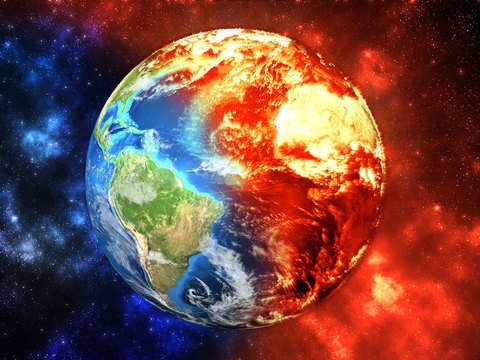|
PRACTICE QUESTION
Question: The rising global temperatures pose significant challenges to the Earth's climate system. In the context of the increasing concerns over the Earth's soaring temperature, discuss the potential impacts on ecosystems, human societies, and international cooperation. Also, analyze the role of sustainable practices and global partnerships in mitigating the adverse effects of climate change. (250 words)
Model Answer:
The Earth's soaring temperature, primarily driven by anthropogenic activities leading to climate change, presents a multifaceted challenge with far-reaching implications for ecosystems, human societies, and the imperative for international cooperation.
Impacts on Ecosystems:
- Biodiversity Loss:
- Rising temperatures contribute to habitat degradation, affecting various species and leading to biodiversity loss. Ecosystems that are unable to adapt may face collapse, disrupting ecological balance.
- Ocean Acidification:
- Elevated temperatures contribute to ocean acidification, negatively impacting marine life, particularly coral reefs and shell-forming organisms. This poses threats to fisheries and coastal communities.
- Extreme Weather Events:
- The increased frequency and intensity of extreme weather events, such as hurricanes, floods, and wildfires, have direct consequences on ecosystems, causing habitat destruction and altering landscapes.
Impacts on Human Societies:
- Food Security:
- Changes in temperature and precipitation patterns affect agricultural productivity, leading to potential disruptions in food supply chains and increased vulnerability of communities dependent on agriculture.
- Water Scarcity:
- Altered precipitation patterns contribute to water scarcity in some regions. This impacts water availability for drinking, agriculture, and industry, leading to socio-economic challenges.
- Health Risks:
- Soaring temperatures contribute to the spread of vector-borne diseases, heat-related illnesses, and exacerbate existing health disparities, especially in vulnerable populations.
- Migration and Conflict:
- Climate-induced changes can lead to displacement and migration, potentially contributing to resource conflicts and social unrest as communities compete for dwindling resources.
International Cooperation:
- Paris Agreement:
- The Paris Agreement, a landmark international accord, aims to limit global temperature rise to well below 2 degrees Celsius. International cooperation is crucial for its successful implementation.
- Technology Transfer:
- Collaborative efforts in technology transfer, particularly in renewable energy, can accelerate the transition to sustainable practices, reducing dependence on fossil fuels.
- Climate Finance:
- Adequate financial support for climate-resilient infrastructure and adaptation measures is essential. Global partnerships can mobilize funds to assist developing nations in coping with the impacts of climate change.
- Capacity Building:
- Building the capacity of developing nations to adapt to and mitigate climate change is a priority. Knowledge-sharing and technology diffusion contribute to global resilience.
Role of Sustainable Practices:
- Renewable Energy Transition:
- Shifting towards renewable energy sources like solar and wind is imperative for reducing greenhouse gas emissions and curbing global temperature rise.
- Conservation and Restoration:
- Sustainable land management, reforestation, and conservation efforts are vital for maintaining carbon sinks and preserving biodiversity.
- Circular Economy:
- Encouraging a circular economy that minimizes waste and promotes recycling helps reduce resource consumption and environmental impact.
In conclusion, addressing the Earth's soaring temperature necessitates a comprehensive approach that encompasses mitigation and adaptation strategies, international collaboration, and the adoption of sustainable practices. Effective policies and actions at both the national and global levels are essential for mitigating the adverse effects and ensuring a resilient and sustainable future for the planet.
|











